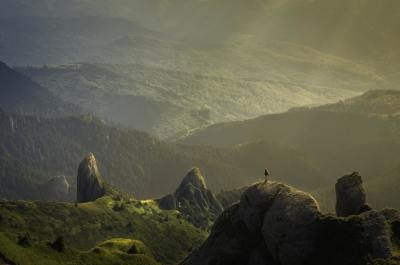Do people belong in nature?

Recently, scientists at the Israeli Weizmann Institute of Science calculated the total biomass of three different categories of living things: humans, domesticated mammals (such as cows and pigs), and wild mammals (such as whales, dolphins, and deer). Researchers estimated the combined weight of every single wild mammal to be about 60 million metric tonnes, the combined biomass of every human being at 390 million metric tonnes, and the combined biomass of the mammals we domesticate at a whopping 630 million metric tonnes. Surprisingly, researchers concluded, only 6% of the combined weight of mammals on Earth can be considered “wild.”
At the same time, we have never had more films available to us about unspoiled nature. Beginning with the BBC’s fantastic 2006 miniseries Planet Earth, an entire subgenre has emerged celebrating the pristine beauty of the natural world, utilizing high-grade cameras, aerial footage, and powerful cinematic scores. The results are incredible. In the words of one commentator, we are the first people in human history to get close enough to African lions “to see the taste buds on their tongue” while still tucked in our beds.
At the same time, in the world of ecology, getting closer to nature has us no closer to having an answer to the perennial question, where do humans belong in the natural world? How we answer that question depends on our assumptions about both ecology and anthropology.
As Weizmann Professor Ron Milo put it,
"The more we’re exposed to nature’s full splendor, be it through films, museums or eco-tourism, the more we might be tempted to imagine that nature is an endless and inexhaustible resource. In reality, the weight of all remaining wild land mammals is less than 10% of humanity’s combined weight, which amounts to only about 6 lbs. of wild land mammal per person."
On one hand, documentaries like "Planet Earth" can motivate us to protect our planet’s beauty. That kind of majesty in detail often prompts a kind of worship, though it is often directed away from the One to whom it is due. Christians who believe that there was an Eden, a world in which nature, humanity, and God were at perfect peace, are given a picture of restoration when the curse is lifted and the ill effects of our fallen humanity are made right on earth as it is in Heaven.
On the other hand, the desire to protect a “pristine” natural world often becomes a kind of conduit for assumptions of naturalism. If humans are only another part of nature, their violation of nature makes them a kind of cancer on the planet; at best, a problem to be solved and, at worst, a plague to be eradicated. Yet such a view cannot adequately sustain the work of conservation.
Writing for The Atlantic in 2021, environmental journalist Emma Marriss put it this way:
"With wilderness set as the gold standard for nature, any human influence has come to be seen as negative by default. The myth has thus ruled out any approaches to saving nature except walling it off and keeping humans out. Trying to “save the planet” with a wilderness mindset has been all about self-exile. It offers “little hope of discovering what an ethical, sustainable, honorable human place in nature might actually look like,” as [William] Cronon wrote."
As an example, Marriss points to criticism directed at the BBC’s 2013 documentary "Africa":
"Although it was stunning, it was missing something vitally important to understanding Africa: Africans … The consequence is that tourists who go to Africa expect to see a pretty wilderness instead of a busy continent of 1.4 billion people."
In other words, documentaries about “untouched” nature often only tell part of the story. Even the materialist must conclude that people are part of the natural world, even if they are convinced that it is for worse instead of for better. The first Europeans to arrive in North America did not find a vast, untouched wilderness. They found a continent with millions of people already living on it.
That may seem like a somewhat obvious point, but it is a vital foundation for any conservation effort. Otherwise, we will wrongly think of nature as an inexhaustible resource available to people without consequence, or we will think of humanity as a problem within nature and the only acceptable solution as returning to some mythical time and place in which nature was left untouched by humans.
The latter belief is not just wishful thinking, it is a category error. Humans steward a world that is incomplete without us. The human capacity to cause destruction is because of the human power to heal and restore.
After creating his extravagantly diverse and interconnected world, God proclaimed, “It is good.” After creating human beings in His image, and tasking them with finishing His creative work on His behalf, He concluded that “It is very good.”
In other words, humans belong in the world. God always wanted His world to be cared for, and we are the right ones for the job.
Originally published at BreakPoint.
John Stonestreet serves as president of the Colson Center for Christian Worldview. He’s a sought-after author and speaker on areas of faith and culture, theology, worldview, education and apologetics.
Kasey Leander is a Fellow with the Oxford Centre for Christian Apologetics (OCCA). Prior to his time at OCCA, Kasey earned an undergraduate degree in history and PPE (Politics, Philosophy, and Economics) from Taylor University. While at Taylor, Kasey served in various ministry roles on campus and was active in student government. He has also worked briefly in politics, serving as an intern in the US Senate in Washington, DC.
Shane Morris is a senior writer at the Colson Center, where he has been the resident Calvinist and millennial, home-school grad since 2010 as an intern under Chuck Colson. He writes BreakPoint commentaries and columns. Shane has also written for The Federalist, The Christian Post, and Summit Ministries, and he blogs regularly for Patheos Evangelical as Troubler of Israel.




























